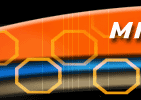




Crew selection should consider health issues, and preclude candidates who do not meet the required health criteria. With our crew of eight, we will need to include at least one medical practitioner and one senior paramedic, in order to diagnose, care for, and treat ill (or injured) crew members.
In addition, every crew member should be trained in basic paramedical procedures, so that they can give interim treatment to any injured crew members from an accident. The contingency that both the primary medical staff might become injured should also be considered. If both medical personnel are incapacitated, who will provide the medical care? All crew members should be trained to cope with biologically caused "accidents" and illnesses, such as food poisoning.
The Crew Selection Procedures will include:
Screening
of potential crew during selection and pre-flight
The first step will be a medical examination
that takes account of the person's medical history. It will
consider, in particular, the diseases the person has suffered from,
is suffering from, and may suffer from in the future. This will
involve genetic screening, for some people have genetic predispositions
towards certain medical conditions and diseases, such as allergies.
Some of these, such as arthritis, are not of microbial origin, but may
cause rejection of a crew candidate.
- genetic disorders - non-microbial
- genetic disorders - microbial-related - carries disease
- genetic disorders - microbial-related - susceptibility
- past exposure to disease - carrier of disease
- past exposure to disease - disability from disease
- past non-exposure to disease - likely to contract disease from another source (crew) - eg chickenpox
- chronic disease - current sufferer
- chronic disease - carrier
- diet - food preferences and balanced eating
- personal habits - smoking, drinking, drug abuse
Crews will be given thorough pre-flight medical examinations to check for new infections. Crew with infections may be prevented from flying until the infection is gone.
Pre-flight
preparation
Isolation of flight personnel from the general community
in the weeks prior to flight has proven effective in reducing the incidence
of developing illnesses, such as colds and viral infections, during a
space flight.
Inoculation
Inoculation of selected diseases and illnesses, such as
influenza vaccination, would be carried out. This will prevent the
incidental development of many possible medical complaints during a mission.
Personal
habits and behavior
The candidates' personal habits will be thoroughly investigated,
to see that they take normal precautions against spreading infection.
Actions such as hand washing after using the bathroom should be something
we all do, but the truth is many people do not carry out this sensible
and easy hygiene procedure. Very often, it is not the person who
has the bad habits who is infected - they are often immune to their own
germs. It is those around them they infect. On
a Space Station, poor hygiene could spread infection very quickly.
Go
to
Home
| Space Station
| Mars | Rainforest
© 1999 Satellite Events Enterprises Inc.